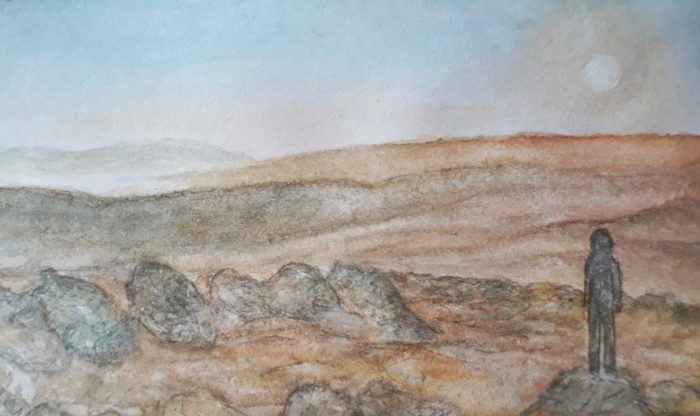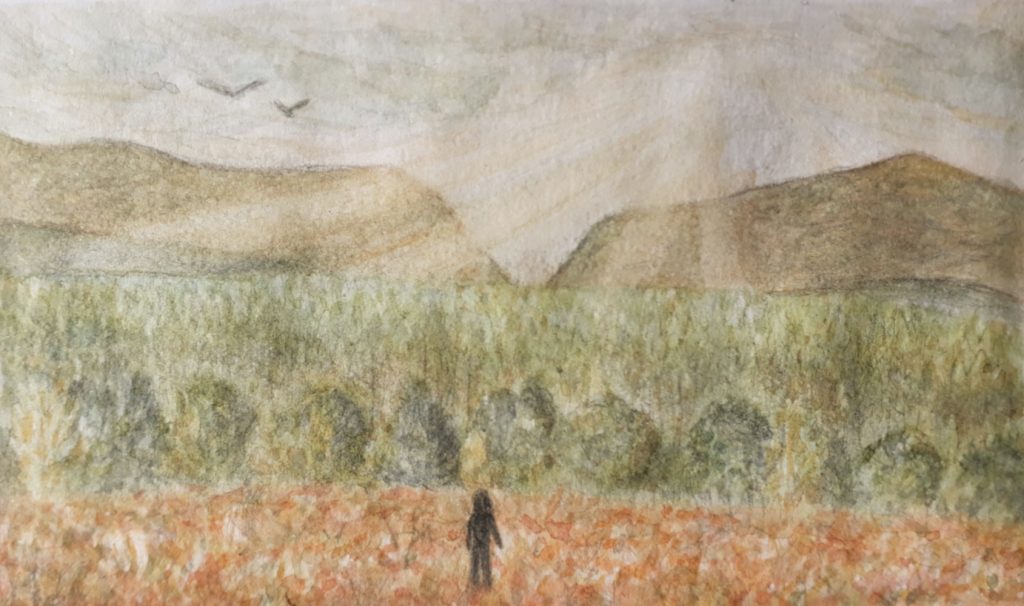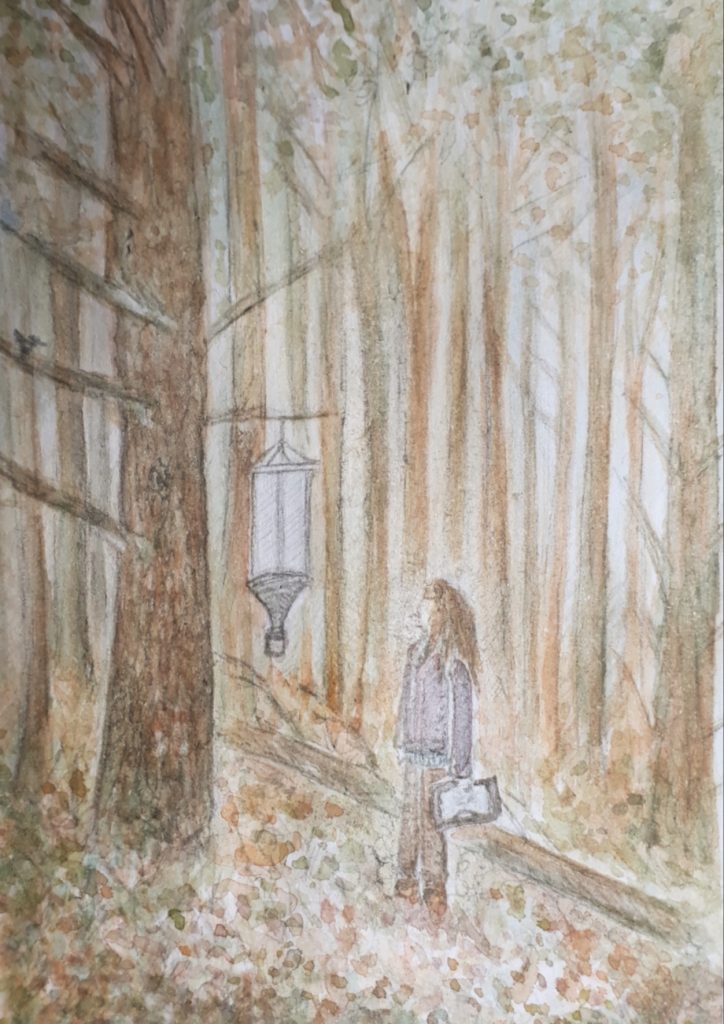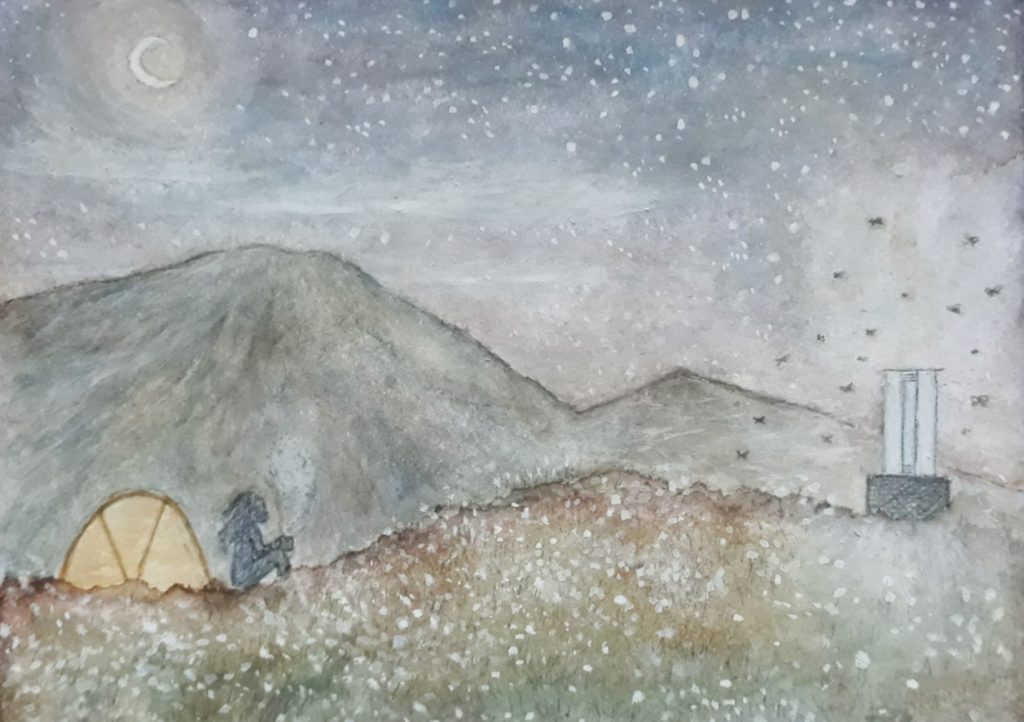A Journey into Conservation
23rd February 2021

It’s 3:55am and the summer sun is just below the horizon of the surrounding peaks, casting a soft glow to the inner of the tent. I wriggle out of my sleeping bag, find some extra layers and unzip the door. It’s calm but cool, the midges not yet flying, with the sky tinged with pink and golden hues as I cross the heather to the light of a moth trap and sit down to start identifying the species that arrived over the night. The sun starts to rise, illuminating the cotton grass so the whole world seems to be glowing.
I’m Ellie, a conservationist working with the monitoring and research team for Cairngorms Connect and a member of the Cairngorms Youth Action Team, living in the Cairngorms National Park. The project I work on, Cairngorms Connect, aims to restore habitats over 600 square kilometers and is a partnership between the RSPB, Forestry and Land Scotland, NatureScot and Wildland Ltd., assisted with funding from the Endangered Landscape Programme.
My job is mostly field-based which means spending a lot of time exploring the National Park to collect data. This ranges from studying beetles, moths, vegetation, and birds as indicators to track different factors in the restoration processes of the project, to reintroducing and re-enforcing isolated rare plants such as twinflower and montane willows, to help ensure their long-term survival here.
Working in conservation is often something that people aren’t aware of as being a viable career option. Being paid to watch wildlife and explore the natural world? Absurd!
When I was 14, there was a poster in my biology lab at school of a marine biologist doing research below the water that was captioned ‘not all scientists wear white coats’. That really caught my imagination. It was the first time I realised science and biology went beyond the classroom and laboratory and actually connected to something tangible – the natural world and the outdoors – that I, as many of us, loved to explore. Although it was a convoluted journey over the next 10 years to get work in conservation science, in that little glimpse I used to daydream when I struggled to grasp an abstract understanding of genetics or protein structures, and lay foundations, as I progressed through university, to choose a career in conservation.
I’m often asked about the journey you need to take to work within conservation in the Cairngorms. With conservation being a fairly competitive field, there’s often not a simple route into entry-level jobs. It can seem like luck, chance, and privilege influence every step. This is an insight into my journey, where I ultimately found work in conservation science, that might help others in theirs.
I graduated from university in 2017 and, with a biology degree in hand, started optimistically applying for conservation-based jobs. And got rejection after rejection.
This is common in conservation – there are often only a limited number of jobs advertised and a lot of people tend to apply. Experience has a lot to play in finding a role and, other than a few days volunteering at local reserves, my own at that point was pretty limited. During this process, however, I applied for the RSPB’s residential volunteer scheme and spent four months over the autumn and winter volunteering at a reserve in Lincolnshire, helping with reserve management. During this I heard about a conservation science-based internship at RSPB Abernethy in the Cairngorms, I applied and now with a little more experience, was successful.
I’m so grateful for the opportunities that the internship then opened. I spent a year helping with everything from surveying capercaillie and eagles to monitoring work for a large-scale field layer management trial to talking to visitors about the wonders of the forest. I lived in a remote lodge in the woods, learning navigation, and spending days-off adventuring, sketching, and learning what I could about the landscape and species found there. It was an incredible year and I learned a lot in a short space of time from species identification to confidently completing fieldwork alone in remote areas to understanding how large-scale science work occurs beyond scientific literature. And of course, being able to take time to explore the Cairngorms – the species that call it home, the mountains, forests, water, and the interplay of light on them through the days and seasons. The never-ceasing movement and change here inspire something in us all.
Then, at the end of the internship (again after another handful of rejections to various conservation jobs and briefly starting another position volunteering), I was successful in an application to the position of Monitoring Officer for Cairngorms Connect. To be honest, there was an element of being in the right place at the right time, but through the internship at Abernethy, I gained a lot of knowledge and skills that wouldn’t have been possible to do this job without.
It is important to recognise the privilege that’s involved in being able to undertake residential volunteer positions for an extended period of time – 18 months in my case. Without an income to gain that vital experience requires either a lot of support or a rather frugal living – my expenses, for example, mostly food, averaged less than £10 a week – or a mix of both to make it work.
Being able to study for a degree in the first place is often a prerequisite or at least desirable for certain roles, which can again be a barrier. These challenges have been recognised and slowly progress is being made through apprenticeships and incentives for entry-level placements, to provide funding for those building experience and to make work more accessible. For now, however, volunteering is generally the most common path people take, and non-residential options are available too, both in the National Park and across the country.
There are many ways of working in the conservation sector that may suit your strengths in different ways – people-focused roles that help connect visitors to their surroundings, communications roles reaching out to people through social media, practical roles delivering conservation management on reserves, administrative roles varying from IT to finance that allow conservation organisations to function and roles that, like mine, involve research and monitoring across an array of different habitats and species groups.
The best advice, if you’re looking to find a job in conservation, is to get as much experience as possible. Broad roles give you the opportunity to try out different types of positions (such as reserve work and visitor engagement) these are a good starting point to work out what suits you best as well as learn a mix of transferable skills that will be useful wherever you end up.
And of course, you will enjoy the process too, volunteering is a lot of fun – it’s a great way to meet people with similar interests, try something new and get involved with meaningful work. And if you’re looking for experience currently, caring deeply and putting energy into your passion, believing in where you want to be, and holding onto that, makes it much easier to be in the right place at the right time and ultimately find that first step in.
There are plenty of ways to get involved and create a positive impact in conservation, in areas like the climate and environment more broadly, without making it a career – we don‘t often do just one thing with our lives after all!
Opportunities like citizen science projects, occasional volunteer days at your local reserve, week-long residential placements, and working holidays at sites across the UK are there for you to give back. Getting involved with local groups, especially those aimed at young people, are all excellent opportunities.
In fact, if you’re aged 14-26 and live in or around the Cairngorms National Park and want to add something positive to your environment and community, perhaps you’d be interested in joining the Cairngorms Youth Action Team, or as a first step just hear a bit more about what we do as a group, we’d love to hear from you!
Contact Alan Smith on email here [email protected] for information on the Cairngorms Youth Action Team.
For more information about Cairngorms Connect please visit their website here http://cairngormsconnect.org.uk/
For information on RSPB Abernethy please visit their website here RSPB Abernethy National Nature Reserve


